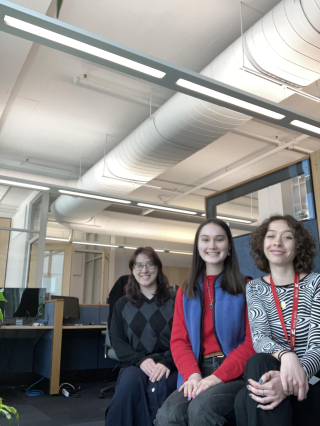I am Amélie Gaillard (she/her), a French student completing an Honours in Cognitive Science with a Minor in Environment. Committed to sustainability and veganism in my personal life, I am fascinated by the psychological tenets of environmental action. Specifically, I am interested in applying behavioral science insights to consumer and farmer decision-making, on the path towards sustainable food systems.

Through this internship, I wanted to experience working in the climate sphere, since I aim to build my career around applying psychology insights to environmental action. During my time at Climate Reality Canada, I hoped to deepen my understanding of the climate space in Canada, and to gain valuable connections in the field. Specifically, I planned to learn about the geographical differences in climate work across Canada and to attend events hosted by our organization or our partners, in order to connect meaningfully with fellow climate advocates. Until now, I had only evolved in research settings, which is why I also looked forward to discovering work life in a more corporate office.

The Climate Reality Project was founded by former vice-president Al Gore, with the intention of encouraging and supporting grassroots initiatives for climate action. The organization’s mission is to catalyze a global solution to the climate crisis by making urgent action a necessity across every sector of society. The Climate Reality Project educates and empowers climate advocates across different branches in a total of 10 countries, including Canada. This branch trains Climate Reality Leaders, coordinates volunteer networks called Community Climate Hubs, supports student advocates through the Campus Corps program, and collects local data on climate solutions thanks to the volunteer-based National Climate League.

During my internship, I contributed to Climate Reality Canada’s engagement strategy by creating and sharing promotional content, selecting volunteer members to showcase for our anniversary celebration, creating educational and skill-based material for volunteer leaders, and communicating with community members. I also drafted a handbook and presentation compiling relevant psychology insights that could be applied to Climate Reality’s engagement and communication strategies. I was given the opportunity to present my work to the team, but also to pitch an engagement project idea to other Climate Reality branches and headquarters at a larger meeting. A large portion of my internship was focused on developing various material to move this project forward. These two more personal endeavors were important highlights of my internship, as was coordinating the first few sessions of our annual Campus Climate Action Summit. After recording a promotional video for this summit, I was lucky enough to witness around fifty young advocates join from across North America, to connect and learn about climate action. The most inspiring part of my internship throughout was the passion, openness, and enthusiasm of my team at Climate Reality Canada.
When I enter new experiences, I tend to grapple with an initial feeling of illegitimacy and inadequacy. I am truly grateful for my supervisor who provided me with the space and encouragement to extend my confidence, for example, to become more proactively involved during team meetings. Another challenge I faced was that of waiting for feedback and new tasks, which I found frustrating at times considering that an intern’s work cannot be a priority in an organization with higher-order concerns. I was able to overcome this feeling of stagnance by attending AIO’s positionality workshop, requesting additional tasks, and taking the initiative to engage in side-of-desk projects such as my psychology handbook.
I am not receiving academic credit for my internship, but am beyond grateful to Mr. Toten for funding my Internship Award. Not only did this generous donation allow me to discover the non-profit sector professionally, but it also provided me with valuable connections and insights into the Canadian sector of environmental work. Furthermore, I would like to thank the Toten family for allowing me to extend my understanding of bottom-up climate work and environmental justice, which I previously had sparse exposure to.
This internship was an integral part of my undergraduate since it allowed me to build on my previous research in environment and psychology. I was able to complement these experiences with a more corporate format of climate work, and now know that I better envision myself evolving professionally in this space. I am also confident that this hands-on working experience will allow me to more deeply grasp the content of my remaining courses. Thank you to the Arts Internship Office and to Mr. Toten for making this incomparable learning process possible.

